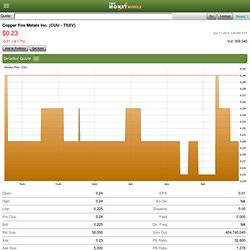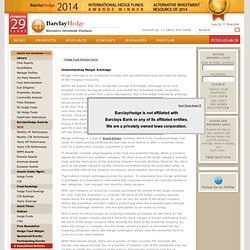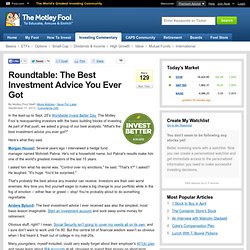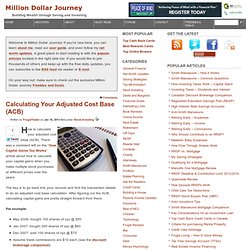

Mobile. Copyright © QuoteMedia, Inc. quotemedia.com Data delayed 15 minutes unless otherwise indicated.

Terms of Service | Privacy Policy © TSX Inc., a wholly owned subsidiary of TMX Group Inc. TMX Group Inc. and its affiliates do not endorse or recommend any securities issued by any companies identified on, or linked through, this site. Please seek professional advice to evaluate specific securities or other content on this site. All content (including any links to third party sites) is provided for informational purposes only (and not for trading purposes), and is not intended to provide legal, accounting, tax, investment, financial or other advice and should not be relied upon for such advice.
Dreman%20Investment%20Philosophy%20and%20Process%20Presentation. Hedge Fund Merger Arbitrage Strategy. > Hedge Fund Articles Home Understanding Merger Arbitrage Merger arbitrage is an investment strategy that simultaneously buys and sells the stocks of two merging companies.

Before we explain that, let’s review the concept of arbitrage. Arbitrage, at its most simplest, involves buying securities on one market for immediate resale on another market in order to profit from a price discrepancy. But in the hedge fund world, arbitrage more commonly refers to the simultaneous purchase and sale of two similar securities whose prices, in the opinion of the trader, are not in sync with what the trader believes to be their “true value.” Merger arbitrage is a type of Event-Driven investing, which is an investing strategy that seeks to exploit pricing inefficiencies that may occur before or after a corporate event, such as a bankruptcy, merger, acquisition or spinoff.
To illustrate, consider what happens in the case of a potential merger. That’s where merger arbitrageurs enter the picture. Security Summary. Stocks - News & Commentary. Roundtable: The Best Investment Advice You Ever Got. In the lead-up to Sept. 25's Worldwide Invest Better Day, The Motley Fool is reacquainting investors with the basic building blocks of investing.

As part of that push, we asked a group of our best analysts, "What's the best investment advice you ever got? " Here's what they said. Morgan Housel: Several years ago I interviewed a hedge fund manager named Mohnish Pabrai. He's not a household name, but Pabrai's results make him one of the world's greatest investors of the last 15 years. I asked him what his secret was. That's probably the best advice any investor can receive. Anders Bylund: The best investment advice I ever received was also the simplest, most basic lesson imaginable. Obvious stuff, right? But I joined my first employer's 401(k) as a deduction from my very first paycheck. The earlier you get started, the better. Dan Caplinger: The best investment advice I ever got was to rebalance my portfolio on a regular basis.
Molly McCluskey: "Have an exit strategy. " Facebook's 'dark side': study finds link to socially aggressive narcissism. Researchers have established a direct link between the number of friends you have on Facebook and the degree to which you are a "socially disruptive" narcissist, confirming the conclusions of many social media sceptics.

People who score highly on the Narcissistic Personality Inventory questionnaire had more friends on Facebook, tagged themselves more often and updated their newsfeeds more regularly. The research comes amid increasing evidence that young people are becoming increasingly narcissistic, and obsessed with self-image and shallow friendships. The latest study, published in the journal Personality and Individual Differences, also found that narcissists responded more aggressively to derogatory comments made about them on the social networking site's public walls and changed their profile pictures more often. The EE aspect includes "a sense of deserving respect and a willingness to manipulate and take advantage of others". Canadian Insider. Finance: Stock market quotes, news, currency conversions & more.
Insider Trades by Symbol. Person Summary. 5-Star Ratings - Price Reports. Calculating Your Adjusted Cost Base (ACB) Welcome to Million Dollar Journey!

If you're new here, you can learn about me, read our user guide, and even follow my net worth updates. A great place to start reading is with the popular articles located in the right side bar. If you would like to join thousands of others and keep up with the free daily updates, you can subscribe to the RSS feed via reader or E-mail. On your way out, make sure to check out the exclusive Million Dollar Journey Freebies and Deals. How to calculate your adjusted cost base (ACB). The key is to go back into your records and find the transaction details to do an adjusted cost base calculation.
For example: May 2006: bought 100 shares of xyz @ $50Jan 2007: bought 200 shares of xyz @ $60Dec 2007: sold 100 shares of xyz @ $75Assume trade commissions are $10 each (see the discount brokerage comparison) What is your capital gain? First you need to figure out your average buy price or Adjusted Cost Base (ACB) or Cost Basis of the stock. photo credit: tompagenet. CanadianMoneySaver_Know_Your_ACBs.